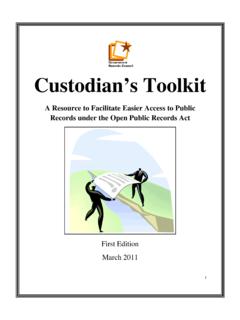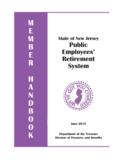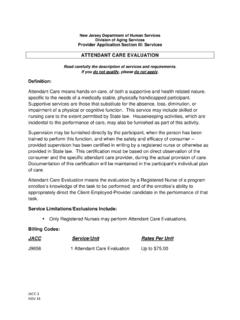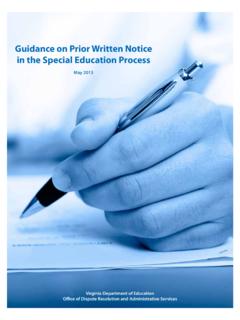Transcription of List of State-Imposed Special Education Rules, Regulations ...
1 List of State-Imposed Special Education rules , Regulations , or Policies in Accordance with 20 1407(a) The New Jersey Department of Education , Office of Fiscal and Data Services, is required to provide to the United states Department of Education , on an annual basis, a list of rules , Regulations and policies that are State-Imposed required by the Individuals with Disabilities Education Act (IDEA) or federal Regulations . The Department must include the list with its annual application for federal funding. The Department is also required to inform all Local Education Agencies of such State-Imposed rules , Regulations and policies.
2 The following is the 2020 list. Updated February 2020 New Jersey Department of Education Document Informing LEAs, in Accordance with 20 1407(a), of State-Imposed rules , Regulations and Policies Not Required by IDEA or Federal Regulations Updated February 2020 A. Timeframes: The following Regulations were adopted to provide consistent timelines to implement IDEA mandates. By regulating timeframes, the state has provided clear expectations for the completion of specific federal mandates. Additionally, mandated timelines are intended to minimize disputes between local school districts and parents as to whether mandates were fulfilled in a timely manner.
3 State-Imposed Requirement Rationale for State Requirement Written notice: 15-day time period for the provision of written notice. 6 (h) IDEA requires that parents be provided written notice when a local school district (LEA) proposes any action pertaining to the identification, referral, evaluation, and placement of students with disabilities. The state developed a timeframe to ensure that parents have sufficient time to consider the actions proposed by the local school district. Excusal from a meeting: Reasonable time period for local school districts to seek and obtain parental consent to excuse a required team member from an IEP team meeting.
4 6 (k)9-10 IDEA provides that the excusal of an IEP team member from a meeting can occur only when the parent is in agreement. The state provision requires that parents be provided a reasonable amount of time to consider a request to excuse a staff member in order to ensure that parents are fully informed and receive sufficient time to consider the excusal. Disciplinary removal: Time period for discipline removals of students with disabilities changed to 45 calendar days rather than 45 school days. 6 (d) and (f) IDEA allows students with disabilities to be removed from school through suspension/expulsion.
5 The federal timeframe for such removals was changed from 45 calendar days to 45 school days. The state maintained the 45 calendar day provision based on the belief that removal for nine weeks was too long a period for a student to be removed from his or her educational program. Determination of eligibility for Special Education : 90-day time period established to complete an initial evaluation and, if eligible, to initiate services. 6 (e) IDEA specifies a 60-day timeline for LEAs to conduct evaluations to determine whether a student is eligible for Special Education and mandates that each student s IEP be implemented without undue delay after the evaluation is completed.
6 The state regulation created a 90-day time period to complete the evaluation of a student with disabilities and, if eligible, to initiate services. This timeframe was developed to define undue delay, by setting a date by which the IEP must be implemented. Provision of reports to parents: 10-day time period for providing parents a copy of evaluation reports prior to the meeting that is held to determine eligibility for Special Education services. 6 (a) IDEA requires that reports and documentation used to determine eligibility for Special Education and to develop a student s IEP be provided to parents.
7 The state regulation was established to ensure that parents have sufficient information and sufficient time to review and consider the evaluation results prior to the eligibility determination and IEP meeting. Amending IEP without a Meeting: 15-day time period for a parent s review of an IEP proposed to be amended without an IEP team meeting; 15-day time period to provide the parent(s) with a copy of the amended IEP. 6 (d) IDEA allows for an IEP to be amended without a meeting. The state regulation was added to provide procedures for making the amendments. New Jersey Department of Education Document Informing LEAs, in Accordance with 20 1407(a), of State-Imposed rules , Regulations and Policies Not Required by IDEA or Federal Regulations Updated February 2020 B.
8 Mediation/Due process Procedures: states are required to have a system in place to implement federal law with regard to mediation and due process hearings . The Regulations that follow provide clear and consistent procedures for mediation and due process hearings to resolve disputes. State-Imposed Requirement Rationale for State Requirement Mediation: Enforcement of mediation agreements. 6 (d)11 IDEA requires states to offer parents and local school districts the opportunity to mediate disputes without the need to incur the time and expense of filing for a due process hearing .
9 This state regulation provides for enforcement of mediation agreements on behalf of parents in order to ensure that parties will agree to mediate and save the expense of a formal due process hearing . Resolution meetings: Require resolution through due process hearings and not complaint investigations of disputes that occur over voiding of resolution meeting agreements held after a parent files for a due process hearing . 6 (h)6iv. Require that disputes over scheduling and conducting a resolution meeting held after a parent files for a due process hearing will be resolved in the due process hearing and not through the complaint investigation process .
10 6 (h)7 Prohibit the recording of a resolution meeting held after a parent files for a due process hearing . 6 (h)3 IDEA requires that states offer local school districts and parents the opportunity to resolve disputes through due process hearings . Prior to such hearings occurring, the parties may participate in a resolution meeting. If an agreement is reached at the resolution meeting, IDEA provides that it may be voided by either party within three business days of it being signed. The state adopted Regulations to provide a forum to resolve disputes if parties seek to void agreements reached at these meetings and when disputes arise over the scheduling and holding of such meetings, and also to prevent audio and video recording of the meetings in order to encourage discussion.












